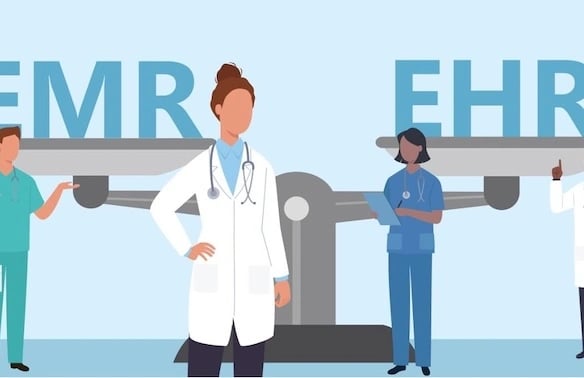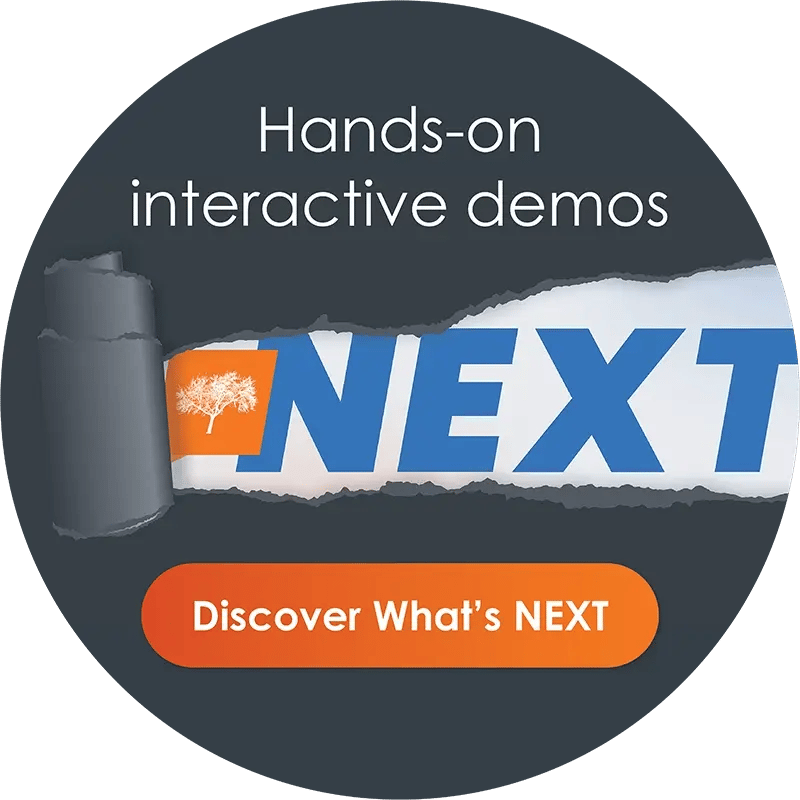EHR vs. EMR: Is There Really a Difference Between the 2?

If you've ever worked with medical practice management software, you know that all of the similar-sounding terms can sometimes get confusing.
And in a senior living context, things are even more nuanced. Additional systems (such as medication administration systems) further complicate things, making it crucial for senior living operators to understand the differences between the various management systems that govern health information.
In this article, we're focusing on two systems — electronic health records (EHRs) and electronic medical records (EMRs) — to demystify these acronyms, highlight their similarities and differences, and help you decide which is most suitable for your senior living community.
Defining the Systems
The terms electronic health record and electronic medical record sound incredibly similar, and it's common for them to be used interchangeably in various settings. However, despite the general similarities between health and medical records, there are key differences that every senior living operator should know about.
The Purpose of EMR Software
The best way to describe EMR software is that it's the digital version of traditional paper records.
EMRs have revolutionized record keeping, eliminating paper charts and replacing them with digital records. Besides improving workflow efficiency, the benefits of EMRs include enhancing the quality of care and reducing instances of human error within a practice.
The kind of information you might find in an EMR includes:
- Allergies
- Lab results
- Medications
- Immunizations
- Treatment plans
- Screenings and checkups
- Demographic, billing, and insurance information
While EMRs can provide a snapshot of a resident's medical records, It's important to remember that the information is restricted to a single practice — such as a doctor’s office or private clinic — and doesn't include the larger network of care providers senior residents typically rely on.
The Purpose of EHR Software
Electronic health records, on the other hand, are more encompassing. They do everything EMRs do, but with a much broader scope of access and functionality.
An EHR system includes all relevant clinical data, whether it’s from primary care providers, pharmacies, or visits to medical professionals, to enhance decision-making support at every stage of a resident's health journey.
There are three types of EHR systems. Cloud-based EHRs, such as Eldermark's ServiceMinder, are the most affordable, offering software interoperability and ease of access for authorized users, including residents. Third-party and physician-hosted EHRs are the two other options.
The benefits of EHRs are considerable. Far from being just a snapshot, they aggregate information from multiple sources to provide a dynamic view of a resident’s health. An EHR system takes in new data, such as medication administration or test results, and can be updated in real time to provide caregivers with a complete picture.
Besides increasing resident safety by reducing medical errors, EHR software also saves money, helping senior living communities generate bigger returns on their investment.
Finally, to ensure the security of personal data in medical practices, the Office of the National Coordinator for Health Information Technology (ONC) oversees the implementation of technology to ensure certified EHR systems comply with regulatory standards such as the Health Insurance Portability and Accountability Act (HIPAA).
Talk to an expert to discover how Eldermark's EHR can help your assisted living community increase resident safety while saving money.
Are EHRs and EMRs the Same?
Yes and no.
Since EHRs and EMRs share so many features, we can't say they're completely different. But by the same token, they're also not exactly the same. A good explanation of the difference between EHR and EMR software is that all EHR systems are also EMRs, but not the other way around.
Electronic medical records are older. They're what came first to replace the tedious, error-prone system of using pen and paper. Over time, as the development of cloud-based technologies exploded, EMRs grew, expanded, and evolved into EHRs.
This “online” vs. “offline” aspect is at the core of what differentiates the two systems. Although switching to digital records is straightforward, implementing a new EHR system comes with additional challenges.
For instance, EHRs that don't have interoperability with billing or CRM software can cause more confusion than efficiency. Staff resistance to learning new procedures and concerns over data security are other EHR implementation challenges that senior living communities need to address.
Which Type of Software Do Senior Living Communities Need?
Every senior living community must independently determine which type of software would best suit the needs of the community’s operations.
EMRs are cheaper and easier to implement for those with budgetary restrictions, but they’re also limited when it comes to providing a holistic picture of a resident's health records. On the other hand, EHRs are ideal for involving as many people as needed to deliver the best, most comprehensive care.
In a senior living context, where residents have multiple care providers in different settings, many operators prefer cloud-based EHRs because these systems offer the most flexibility. By following the four keys to successful EHR integration, operators can bypass the hurdles and begin reaping the benefits.
So instead of focusing on whether EHRs and EMRs are the same, the real question is which would best fulfill your senior living community's needs and long-term objectives.
Eldermark: The Leader in Senior Living Software Solutions
At Eldermark, we get senior living. Our team of developers, experts, and consultants consists of former operators and caregivers who understand the needs, nuances, and unique challenges that many senior living communities face.
Helping the sector thrive isn't just something we do — it's all we do. For 30 years, we've designed software solutions specifically to enhance senior living operations, facilitate their expansion, and improve the population’s health.
Our software solutions, including our EHR, ServiceMinder, cover every aspect of assisted living, from marketing and customer relations to medication administration, medical billing, and invoicing.
Want to learn more? Contact us for a personalized demonstration and find out how Eldermark can take your senior living operation to the next level.




